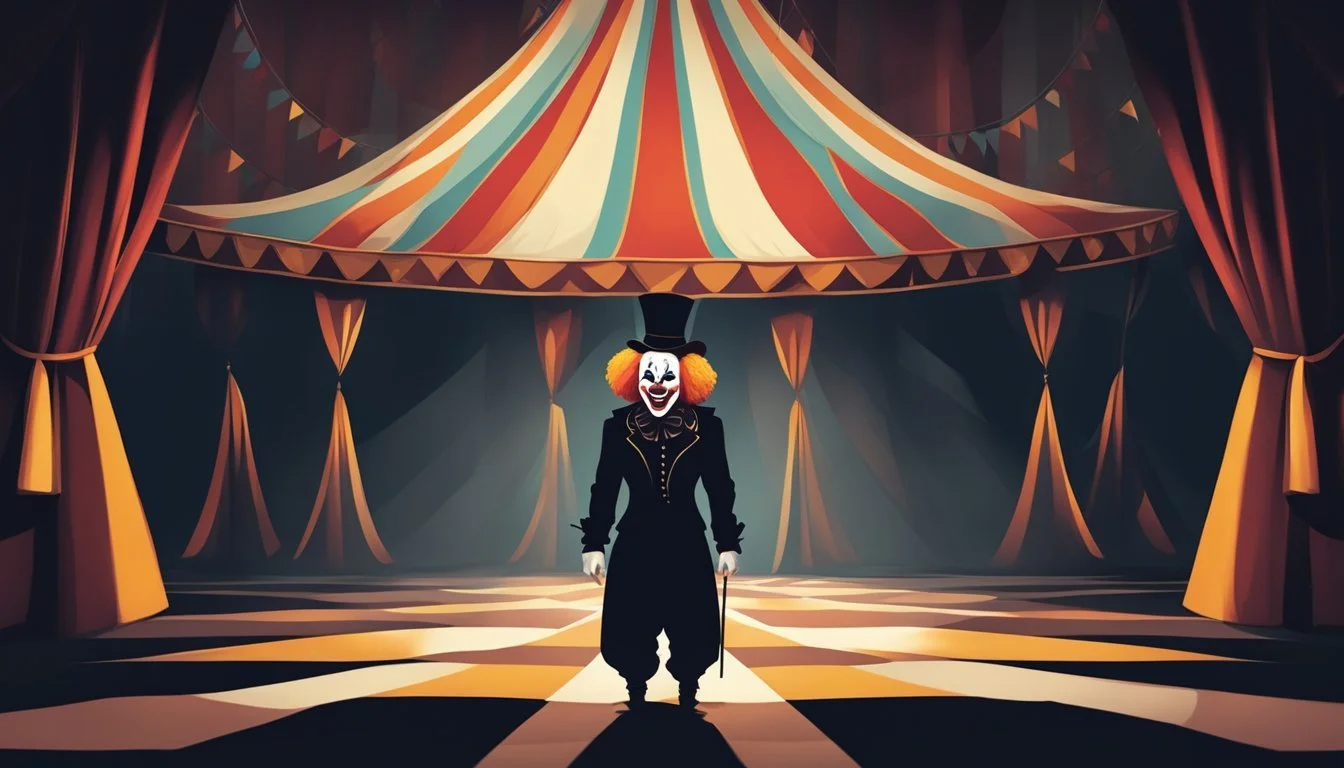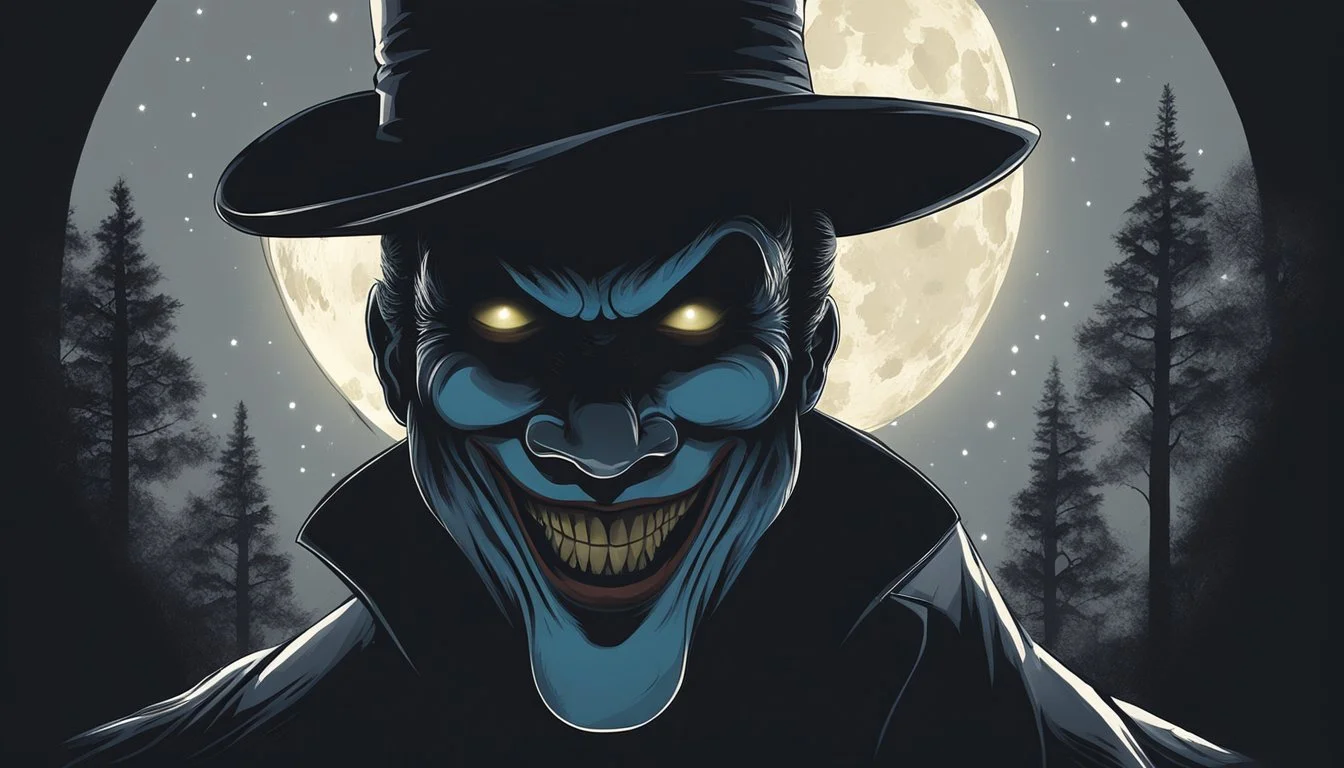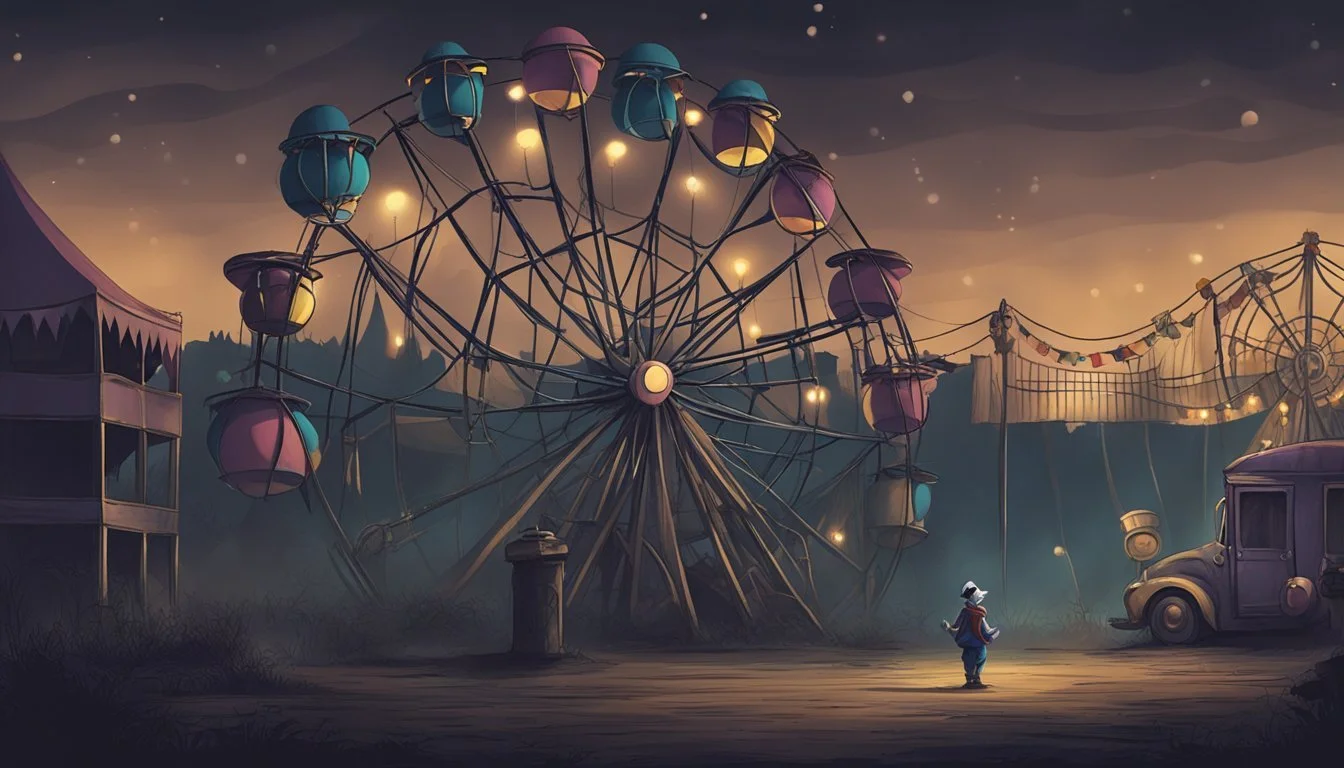John Wayne Gacy: 9 Terrifying Films About the Killer Clown
A Cinematic Exploration of a Notorious Serial Killer
John Wayne Gacy, known as the "Killer Clown," left an indelible mark on American criminal history. His heinous crimes shocked the nation and continue to captivate public interest decades later. The combination of Gacy's seemingly normal facade and the brutality of his murders has made him a subject of numerous true crime documentaries and dramatizations.
The cinema has not shied away from exploring Gacy's dark legacy, producing a range of films that delve into his twisted psyche and horrific acts. These movies vary in their approach, from psychological thrillers to horror films, each offering a unique perspective on one of America's most notorious serial killers. Some focus on Gacy's crimes, while others examine the aftermath and impact on his victims' families and the community at large.
1) To Catch a Killer
This 1992 television miniseries dramatizes the hunt for John Wayne Gacy. Directed by Eric Till, it stars Brian Dennehy as Gacy and Michael Riley as Lt. Joe Kozenczak, the detective who led the investigation.
The film spans two parts, totaling four hours. It focuses on the disappearance of 15-year-old Chris Gant and the subsequent police investigation that uncovered Gacy's heinous crimes.
Dennehy delivers a chilling performance as Gacy, portraying his dual nature as a respected businessman and community figure who secretly committed horrific acts. The film explores how Gacy managed to evade suspicion for so long.
Riley's portrayal of Lt. Kozenczak highlights the dogged determination of law enforcement to bring Gacy to justice. The movie details the challenges faced by investigators as they pieced together evidence and built their case.
"To Catch a Killer" offers a gripping look at one of America's most notorious serial killers. It provides insight into both Gacy's crimes and the intensive police work required to apprehend him.
https://www.imdb.com/title/tt0105608/
2) Dear Mr. Gacy
Dear Mr. Gacy is a 2010 film based on the true story of Jason Moss, an 18-year-old college student who corresponded with serial killer John Wayne Gacy for his thesis project. The movie stars Jesse Moss as Jason and William Forsythe as Gacy.
The film depicts Jason's dangerous journey into the mind of a serial killer. He impersonates Gacy's typical victims to gain his trust, leading to a chilling psychological game between the two.
Director Svetozar Ristovski brings the disturbing tale to life, showcasing the risks of getting too close to a manipulative criminal. The movie explores the dark fascination some have with notorious killers.
Dear Mr. Gacy offers a unique perspective on the infamous Killer Clown. It delves into the aftermath of his crimes and the lasting impact on those who seek to understand his twisted psyche.
https://www.imdb.com/title/tt1364343/
3) The Clown at Midnight
The Clown at Midnight is a 1998 slasher film directed by Jean Pellerin. It draws inspiration from the John Wayne Gacy case, featuring a killer who dresses as a clown.
The plot revolves around a group of high school students renovating an old theater. They become targets of a mysterious clown-masked murderer with ties to the theater's dark past.
Christopher Plummer stars as Mr. Caruthers, the theater owner with secrets. Margot Kidder plays a drama teacher guiding the students. Sarah Lassez portrays Kate, the main protagonist uncovering the truth.
The film incorporates elements of Gacy's crimes, such as the killer's clown persona and targeting of young victims. It blends these with classic slasher movie tropes like isolated settings and a masked villain.
While not a direct portrayal of Gacy, The Clown at Midnight uses his notorious image to create tension and fear. The killer's clown costume serves as a chilling reminder of Gacy's real-life deception.
https://www.imdb.com/title/tt0157493/
4) Gacy (2003)
Gacy is a direct-to-video crime horror thriller released in 2003. The film is based on the real-life crimes of John Wayne Gacy, the notorious serial killer who terrorized Chicago in the 1970s.
Directed by Clive Saunders and co-written by David Birke, the movie aims to portray Gacy's disturbing double life. It explores how he maintained a facade of normalcy while committing heinous acts.
Mark Holton stars as John Wayne Gacy, depicting his public persona as a respected community member and his private life as a ruthless killer. The film recreates Gacy's methods of luring young men and boys to his home.
Gacy delves into the darker aspects of the killer's psyche, showing his descent into madness and the eventual discovery of his crimes. The movie doesn't shy away from depicting the grim reality of Gacy's actions.
While not a blockbuster, Gacy offers a chilling look at one of America's most infamous serial killers. It serves as a reminder of the evil that can lurk behind seemingly ordinary exteriors.
https://www.imdb.com/title/tt0330181/
5) 8213: Gacy House
8213: Gacy House is a found footage horror film released in 2010. The movie takes its name from John Wayne Gacy's actual address where he committed his crimes.
The plot revolves around a group of paranormal investigators who decide to spend the night at the site of Gacy's former home. They set up cameras and equipment to capture any supernatural activity.
As the night progresses, strange occurrences begin to plague the team. They experience unexplained noises, moving objects, and ghostly apparitions.
The film plays on the real-life horrors associated with Gacy's crimes. It attempts to blend historical fact with fictional supernatural elements.
While not a high-budget production, 8213: Gacy House aims to create tension through its found footage style and connection to true events. The movie taps into the morbid fascination surrounding infamous serial killers and their crimes.
https://www.imdb.com/title/tt1609806/
6) Killer Clown: The John Wayne Gacy Murders
"Killer Clown: The John Wayne Gacy Murders" is a book rather than a film, but it provides crucial source material for many Gacy-inspired movies. Written by Terry Sullivan, the prosecutor who led the investigation and arrest of John Wayne Gacy, this true crime account offers unparalleled insights into the case.
The book delves into the details of Gacy's crimes, his arrest, and subsequent trial. It presents a comprehensive look at one of America's most notorious serial killers, drawing from Sullivan's firsthand experience with the investigation.
Sullivan's work has served as a primary reference for filmmakers and screenwriters tackling the Gacy story. Its vivid descriptions and insider knowledge have influenced numerous cinematic portrayals of the Killer Clown.
While not a film itself, "Killer Clown: The John Wayne Gacy Murders" has significantly shaped the narrative surrounding Gacy in popular culture. Its impact can be seen in the accuracy and depth of many films based on the Gacy case.
7) John Wayne Gacy: Devil in Disguise
John Wayne Gacy: Devil in Disguise is a 2021 true crime documentary series that explores the chilling story of the notorious serial killer. The six-part series offers a comprehensive look at Gacy's life and crimes through interviews and archival footage.
The documentary features conversations with key figures involved in the case, including law enforcement officials, prosecutors, and journalists. It also includes rare footage of Gacy himself, providing viewers with a disturbing glimpse into his psyche.
Devil in Disguise delves into Gacy's background, examining his childhood, family life, and early criminal activities. The series meticulously traces his descent into becoming one of America's most infamous serial killers.
The documentary also explores the lasting impact of Gacy's crimes on the victims' families and the community. It raises questions about the investigation and whether all aspects of the case have been fully resolved.
John Wayne Gacy: Devil in Disguise offers a comprehensive and unsettling examination of the "Killer Clown" and his heinous acts. The series presents a detailed account of one of the most notorious criminal cases in American history.
https://www.imdb.com/title/tt13847836/
8) Serial Killer Culture
John Wayne Gacy's horrific crimes have left a lasting impact on popular culture, spawning numerous films that explore the dark fascination with serial killers. These movies often delve into the psychology of both the killer and the public's morbid curiosity.
One such film is "Dahmer vs. Gacy" (2010), a horror-comedy that pits Gacy against fellow serial killer Jeffrey Dahmer. This low-budget production exemplifies the sometimes sensationalistic approach to true crime stories in media.
The documentary series "The Clown and the Candyman" (2021) takes a more serious tone. It examines the connections between Gacy and Dean Corll, another notorious killer, highlighting the broader cultural impact of these crimes.
These films reflect society's complex relationship with serial killer narratives. They serve as cautionary tales, sources of morbid fascination, and attempts to understand the darkest aspects of human nature.
The ongoing production of Gacy-related content demonstrates the enduring public interest in his case. It also raises questions about the ethics of true crime entertainment and its potential to glorify violent criminals.
9) Born to Kill?
"Born to Kill?" is a documentary television series that delves into the psychology of notorious serial killers. One episode focuses on John Wayne Gacy, titled "The Killer Clown."
The episode examines Gacy's life, crimes, and the factors that may have contributed to his murderous behavior. It features interviews with experts and individuals connected to the case.
Viewers gain insight into Gacy's troubled childhood, his public persona as a respected businessman and community member, and his secret life as a violent predator. The documentary explores the contrast between Gacy's outward appearance and his inner darkness.
"Born to Kill?" presents a clinical analysis of Gacy's psychology, attempting to understand what drove him to commit such horrific acts. It discusses theories about potential genetic or environmental influences on his criminal behavior.
The episode serves as a chilling examination of one of America's most infamous serial killers, offering viewers a glimpse into the mind of a man who terrorized his community while hiding behind a clown's makeup.
Background on John Wayne Gacy
John Wayne Gacy was an American serial killer who murdered at least 33 young men and boys in the 1970s. He became known as the "Killer Clown" due to his performances as a clown at community events.
Early Life
Born on March 17, 1942, in Chicago, Illinois, Gacy had a troubled childhood. His father was an alcoholic who physically abused him. As a teenager, Gacy struggled with his sexuality and experienced health issues.
He married in 1964 and moved to Iowa, where he managed a Kentucky Fried Chicken franchise. Gacy became involved in local politics and community organizations, presenting himself as a respectable businessman.
In 1968, Gacy was convicted of sexually assaulting a teenage boy. He served 18 months in prison before being released on parole in 1970.
Crimes and Convictions
After his release, Gacy moved back to Chicago and started a construction business. He began his killing spree in 1972, targeting young men and boys.
Gacy lured victims to his home with promises of work or alcohol. He would then sexually assault, torture, and strangle them. Most bodies were buried in the crawl space under his house.
His crimes went undetected for years until the disappearance of Robert Piest in 1978 led police to investigate Gacy. A search of his property revealed the remains of 29 victims.
Gacy was arrested in December 1978. He was convicted of 33 murders in 1980 and sentenced to death.
Psychological Profile
Experts classified Gacy as a psychopath with antisocial personality disorder. He showed a lack of empathy and remorse for his crimes.
Gacy's dual persona - respected community member and brutal killer - fascinated psychologists. His ability to compartmentalize his life allowed him to maintain a normal facade while committing heinous acts.
Some theories suggest Gacy's abusive childhood and struggles with his sexuality contributed to his violent behavior. However, the full extent of his motivations remains unclear.
Gacy's case highlighted the ability of serial killers to blend into society, prompting changes in law enforcement approaches to missing persons cases.
Portrayals in Film
John Wayne Gacy's disturbing crimes have been depicted in numerous films, ranging from documentaries to fictionalized accounts. These portrayals have shaped public perception and left a lasting impact on popular culture.
Accuracy vs. Fiction
Films about Gacy often blur the line between fact and fiction. Some strive for historical accuracy, meticulously recreating events based on police records and witness accounts. Others take creative liberties, dramatizing scenes for heightened effect.
"To Catch a Killer" (1992), starring Brian Dennehy, is praised for its attention to detail. It closely follows the investigation that led to Gacy's arrest.
In contrast, "Gacy" (2003) with Mark Holton takes a more sensationalized approach. It includes fabricated scenes and exaggerated character traits.
Documentaries like "The Killer Clown" aim for factual precision. They incorporate archival footage and interviews with those involved in the case.
Impact on Pop Culture
Gacy-inspired films have significantly influenced horror cinema and true crime media. His "Killer Clown" persona has become a chilling trope in popular culture.
The 2017 adaptation of Stephen King's "It" drew parallels to Gacy with its terrifying clown antagonist, Pennywise. This connection heightened the character's fear factor for many viewers.
TV series like "American Horror Story: Freak Show" have featured Gacy-inspired characters, further cementing his place in the public imagination.
These portrayals have sparked debates about the ethics of true crime entertainment. Critics argue they may glorify killers, while supporters claim they raise awareness about real-world dangers.




